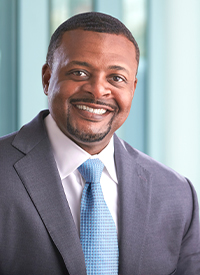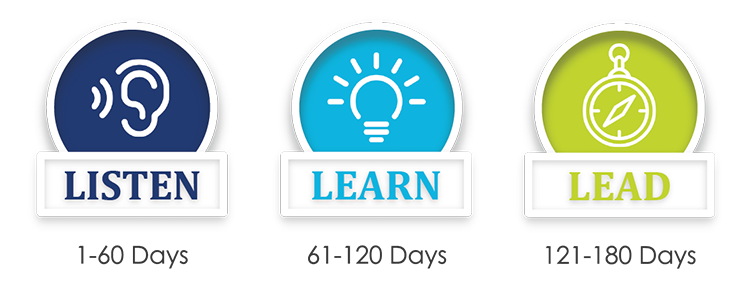
Dr. Lorenzo L. Esters
This summer, Lorenzo Esters joined the philanthropic collaborative as the new president of The Indianapolis Foundation. Here is a brief introduction to what inspires him and his plan for the future:
What is the most meaningful community impact you’ve made in your career?
For most of my more than 25-year career, I have worked to create opportunities for all. My career has primarily focused on creating racial and economic equity through higher education access, success, and workforce development. My lived experiences have informed my passion for this work as a first-generation college attendee from the Mississippi Delta. A single mother raised me and my older brother in a working-class household after my father succumbed to cancer when I was only three years old. Education and training were my pathways out of poverty, and I have devoted my life to creating opportunities for others to access education, training, skills, and resources so that they may also build a path to economic mobility.
I firmly believe that higher education has been crucial to my success as a person of color from a low-income family and as a first-generation college attendee. My purposeful passion for closing equity gaps in education and workforce attainment was realized serving as vice president for enrollment and student success at Kentucky State University and later as chancellor for Ivy Tech Indianapolis. I also provided over $17 million in grants to support these efforts while serving as program director and vice president for philanthropy with Strada Education Network.
Education and training were my pathways out of poverty, and I have devoted my life to creating opportunities for others to access education, training, skills, and resources so that they may also build a path to economic mobility.
Ultimately, my most meaningful impact has been creating ecosystems of support and dismantling barriers that impede economic mobility. My experience aligns with the mission of The Indianapolis Foundation, which is why I am so excited for the opportunity to do this work!
What is your top priority in your first six months in this role?
To be an effective organizational leader, one must first understand and appreciate the history of an organization. I have developed a Listen-Learn-Lead approach to onboarding. Through this approach, I will meet one-on-one and in focus groups with internal staff and leadership, current and former grantees, community-based organization leaders, employers, current and past donors, elected officials, board members, and many others.

Through this process, I will seek to identify broad themes and understand the organization’s strengths, weaknesses, opportunities, and threats. I will also review the learnings from our existing grant portfolios to understand and begin to measure our impact. You can expect me to be in the community as much as possible, listening and learning. All of this is to inform how I and the board will approach the next steps in our strategic planning process and my next steps as the leader of The Indianapolis Foundation.
What do you see as your single biggest opportunity for growth in our community within your leadership?
Community foundations often play three distinct roles within their communities: grantmakers, asset-builders (fundraisers) and community leaders. When I think of these three roles, as your next leader of The Indianapolis Foundation, I do believe I have a strategic advantage as I have been involved in this very work for almost a decade, and as such have built key relationships upon which I might leverage for friend-raising, fundraising and grantmaking. My biggest opportunity will be to cast a co-created vision that is informed and inspired by the community with comprehensive—yet intentionally focused—key impact areas.
My goal is to leverage partnerships with other funders and philanthropic organizations, employers, donors, and all who believe in the mission of The Indianapolis Foundation—to make Indianapolis a thriving city where all have equitable opportunity to reach their full potential—no matter race, place or identity.
For all of us to work in concert and be impactful, all three distinct roles must be in play simultaneously. One way that I will achieve this is through authentic and genuine reciprocal partnerships. I believe in the power of community partnerships. My goal is to leverage partnerships with other funders and philanthropic organizations, employers, donors, and all who believe in the mission of The Indianapolis Foundation—to make Indianapolis a thriving city where all have equitable opportunity to reach their full potential—no matter race, place or identity.
What are you most excited to learn about in this position?
Darren Walker, the president of the Ford Foundation, recently wrote a book titled “From Generosity to Justice: A New Gospel of Wealth.” In the book, Darren discusses a focused future for philanthropic organizations, and he surmises that philanthropy must do more than provide charity or generosity.
Walker suggests we must not merely respond to the results of the root causes of issues, but we should seek to address their systemic or root causes. I am most excited about doing just that. I want to identify the most promising and meaningful ways that The Indianapolis Foundation can live out the essence of our mission through purposeful and focused strategies that are measurable and that might yield tangible impact for communities and to dig deeper, addressing the root causes of racial and economic inequality. We must be focused and aligned with our community. I promise to listen, learn and lead.
What I love most about our community is that we have some of the best examples of community partnerships in the nation.
What aspect of our community brings you the most joy?
Living and working in the Circle City brings me joy that is unquantifiable. What I love most about our community is that we have some of the best examples of community partnerships in the nation. Central Indiana—and more explicitly the City of Indianapolis—has a very healthy ecosystem comprised of government, education, business, healthcare, civic, religious, philanthropy and individual donors who are collectively trying to address the challenges our community faces. I can think of many meaningful examples where focused efforts to address some of our community’s greatest challenges might serve as a model for other cities. Without a doubt, The Indianapolis Foundation can be and in fact, will be a leader, a convener and a connector in helping our community to scale the most exemplary of these practices. What I know for sure is we cannot do this work alone. And what brings me radical joy is that we live in a city—the Crossroads of America—where we don’t have to.






Great article..I can’t wait to see Dr. Lorenzo Esters to some great work..
Thank you Dr. Esters for taking the time to listen and learn but just as Important, in the text above you shared some carefully developed thoughts with the larger community.
Please Keep sharing what you are Learning while being open to new ideas. Be visionary and move beyond cooperating partnerships to collaboration for equity of opportunity. for example, we can Truly support formerly incarcerated men and women ( as your team started at Ivy Tech) with even stronger collaborations in philanthropy.
With appreciation for your leadership.